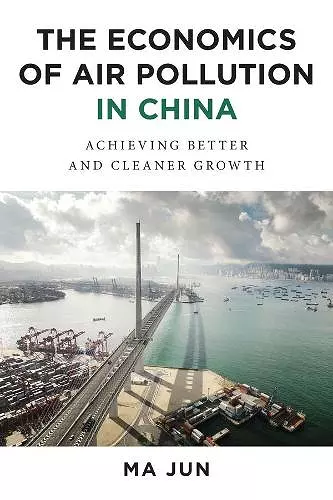The Economics of Air Pollution in China
Achieving Better and Cleaner Growth
Format:Hardback
Publisher:Columbia University Press
Published:13th Dec '16
Currently unavailable, and unfortunately no date known when it will be back

Suffocating smog regularly envelops Chinese metropolises from Beijing to Shanghai, clouding the future prospect of China's growth sustainability. Air pollutants do not discriminate between the rich and the poor, the politician and the "average Joe." They put everyone's health and economic prosperity at risk, creating future costs that are difficult to calculate. Yet many people, including some in China, are concerned that addressing environmental challenges will jeopardize economic growth. In The Economics of Air Pollution in China, leading Chinese economist Ma Jun makes the case that the trade-off between growth and environment is not inevitable. In his ambitious proposal to tackle severe air pollution and drastically reduce the level of so-called PM 2.5 particles-microscopic pollutants that lodge deeply in lungs-Ma Jun argues that in targeting pollution, China has a real opportunity to undertake significant structural economic reforms that would support long-term growth. Rooted in rigorous analyses and evidence-based projections, Ma Jun's "big bang" proposal aims to mitigate pollution and facilitate a transition to a greener and more sustainable growth model.
Many engineering solutions to China's huge pollution problem have been proposed, yet The Economics of Air Pollution in China correctly identifies the structural drivers of pollution and sets out the required changes in economic, financial, and fiscal policies. Meticulous, comprehensive, and rooted in robust economic theory, the book's messages are relevant to other economies that seek environmentally sustainable growth. -- Adair Turner, chairman of the Institute of New Economic Thinking and former chairman of UK Financial Services Authority Ma Jun developed a fascinating approach to analyzing the economic causes of and response to China's problem of air pollution. His ideas should have much powerful applications in policy-making for promoting environmentally sustainable growth both in China and the rest of the world. His arguments that firms and investors' objective functions can be modified from 'profit maximization only' to include 'social responsibility' will have profound implications for economic theory and public policy debate. -- Nicholas Stern, London School of Economics, president of the British Academy, and former chief economist of the World Bank For the first time, The Economics of Air Pollution in China systemically studied the issue of air pollution in China from an economic perspective, which will have important academic and policy implications. A profound view from this book is that while clean technologies are important in reducing emissions, greater efforts need to be made to resolve China's economic structural problems, such as excessive reliance on heavy manufacturing, coal, and road transportation. -- Wu Jinglian, senior researcher, China State Council Development Research Center As chief economist of the PBOC and cochair of the G20 Green Finance Study Group, Ma Jun has played a groundbreaking role in the development of China's green financial system and in promoting a global consensus of aligning the world's financial system to environmentally sustainable growth. The collaboration between UNEP and China (including Ma Jun's team) on green finance was a true success story. -- Achim Steiner, former United Nations undersecretary general and executive director of the United Nations Environment Programme Economic growth and environmental protection are often pitted against each other as trade-offs-a view that continues to dominate in China. Ma Jun's book, however, shows that such a trade-off isn't necessary. Based on robust economic analysis and concrete prescriptions, Ma Jun's work makes a strong case for why continued economic reforms can deliver China a twofer: healthy economic growth and clearer skies and cleaner environment. This is important work that should be read by policy makers in both China and the United States. -- Henry M. Paulson Jr., chairman of the Paulson Institute, former U.S. Secretary of Treasury, and author of Dealing with China
ISBN: 9780231174947
Dimensions: unknown
Weight: unknown
312 pages